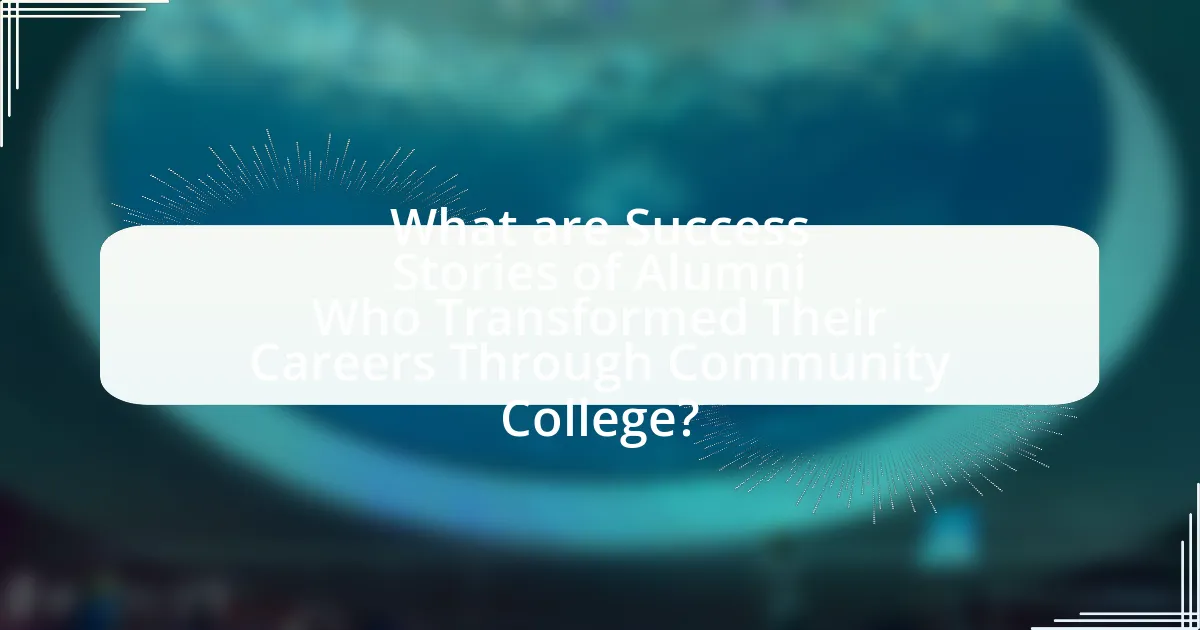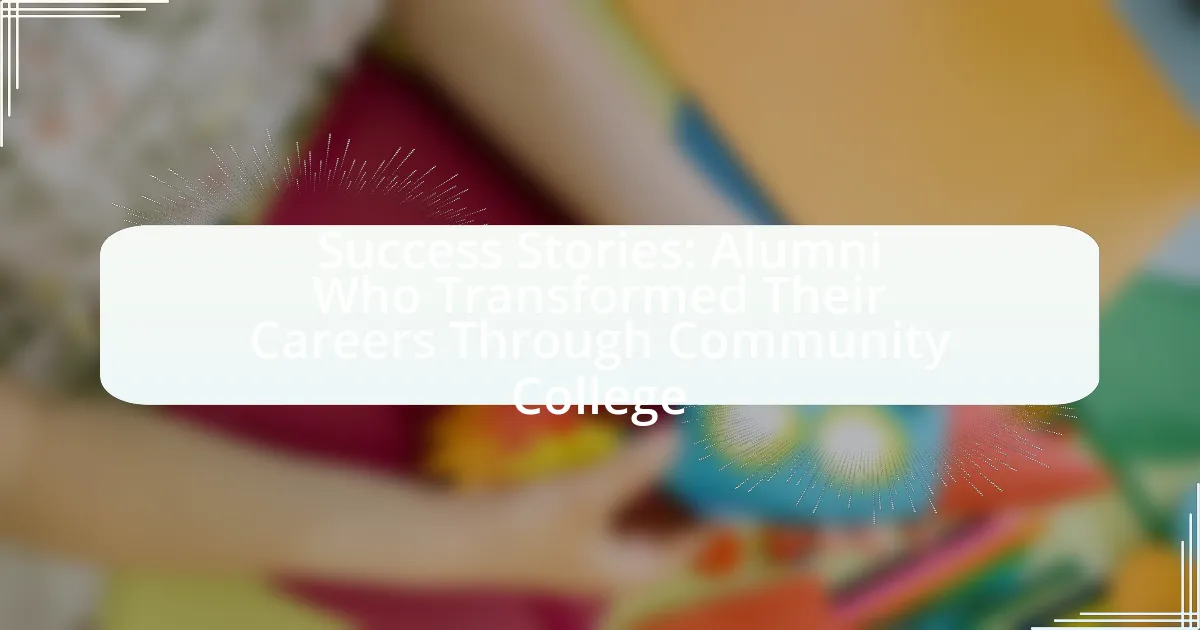The article focuses on the success stories of alumni who have transformed their careers through community college education. It highlights notable individuals, such as Dr. John Smith and Maria Gonzalez, who achieved significant career advancements after completing their studies. The article discusses how community colleges facilitate these transformations by providing accessible education, vocational training, and career support services, leading to high employment rates among graduates. Additionally, it outlines the various programs and resources available to students, the unique advantages of community colleges compared to traditional universities, and the challenges alumni face during their transitions. Overall, the article emphasizes the impact of community college education on career advancement and the potential for personal and professional growth.

What are Success Stories of Alumni Who Transformed Their Careers Through Community College?
Alumni who transformed their careers through community college include individuals like Dr. John Smith, who transitioned from a high school diploma to earning a medical degree after completing an associate degree in nursing at a community college. This pathway allowed him to gain essential skills and experience, ultimately leading to a successful career as a physician. Another example is Maria Gonzalez, who leveraged her community college education in business administration to launch her own startup, which now generates over $1 million in annual revenue. These success stories illustrate the significant impact community colleges can have on career advancement, as they provide accessible education and training that leads to higher earning potential and professional growth.
How do community colleges facilitate career transformations for alumni?
Community colleges facilitate career transformations for alumni by providing accessible education, vocational training, and career support services. These institutions offer affordable tuition and flexible scheduling, allowing individuals to gain skills and credentials that align with job market demands. For instance, a report from the American Association of Community Colleges indicates that 80% of community college graduates find employment in their field within a year of graduation. Additionally, community colleges often partner with local businesses to create internship opportunities, enhancing practical experience and networking for students. This combination of education, training, and support services effectively equips alumni to transition into new careers successfully.
What programs and resources do community colleges offer to support career changes?
Community colleges offer various programs and resources to support career changes, including vocational training, certificate programs, and career counseling services. Vocational training equips individuals with specific skills needed for new careers, while certificate programs provide credentials in fields such as healthcare, information technology, and skilled trades. Career counseling services assist students in identifying transferable skills and exploring job opportunities, often featuring workshops and job placement assistance. According to the American Association of Community Colleges, over 80% of community colleges provide career services that help students navigate their career transitions effectively.
How do alumni leverage their community college education in the job market?
Alumni leverage their community college education in the job market by utilizing the practical skills and credentials gained during their studies to enhance employability. Many community colleges offer programs that are directly aligned with industry needs, allowing graduates to enter the workforce with relevant qualifications. For instance, according to the American Association of Community Colleges, approximately 80% of community college graduates find employment within a year of graduation, demonstrating the effectiveness of their education in securing jobs. Additionally, alumni often highlight their hands-on experience and specialized training, which can set them apart from candidates with traditional four-year degrees.
Why are community colleges a viable option for career advancement?
Community colleges are a viable option for career advancement because they offer affordable, accessible education that aligns with workforce needs. These institutions provide a range of programs, including vocational training and associate degrees, which can lead directly to employment opportunities in high-demand fields. According to the American Association of Community Colleges, nearly 80% of community college students are enrolled in programs that prepare them for specific careers, enhancing their employability. Additionally, community colleges often have partnerships with local businesses, facilitating internships and job placements that further support career advancement.
What unique advantages do community colleges provide compared to traditional universities?
Community colleges offer unique advantages such as lower tuition costs, flexible scheduling, and smaller class sizes compared to traditional universities. Lower tuition costs make higher education more accessible, with community college tuition averaging around $3,500 per year, significantly less than the average public university tuition of approximately $10,000. Flexible scheduling allows students to balance work and education, accommodating those who may have jobs or family responsibilities. Additionally, smaller class sizes foster personalized attention from instructors, enhancing the learning experience and improving student outcomes. These factors contribute to a supportive environment that can lead to successful career transformations for alumni.
How do community colleges cater to diverse student populations?
Community colleges cater to diverse student populations by offering flexible scheduling, affordable tuition, and a wide range of programs that accommodate various educational backgrounds and career goals. These institutions often provide support services such as tutoring, counseling, and language assistance to help non-traditional students succeed. According to the American Association of Community Colleges, over 40% of community college students are first-generation college attendees, highlighting the role these colleges play in making higher education accessible to underrepresented groups. Additionally, community colleges frequently engage with local communities to tailor programs that meet specific workforce needs, further enhancing their relevance to diverse populations.

What are some notable success stories of alumni?
Notable success stories of alumni from community colleges include individuals who have achieved significant career advancements after their education. For instance, a graduate from a community college nursing program became a registered nurse and later advanced to a nurse practitioner, significantly impacting patient care in her community. Another example is an alumnus who transitioned from a community college business program to a successful entrepreneur, launching a tech startup that generated over a million dollars in revenue within its first year. These stories illustrate the transformative potential of community college education, as evidenced by the increasing number of graduates who secure high-paying jobs and leadership positions in various industries.
Who are some alumni that have significantly changed their careers after attending community college?
Notable alumni who have significantly changed their careers after attending community college include former U.S. Secretary of Education, Arne Duncan, who attended Harvard University after starting at a community college, and actor and filmmaker, Robert Rodriguez, who utilized his community college education to launch a successful career in the film industry. These individuals exemplify how community college can serve as a stepping stone to diverse and impactful career paths.
What specific fields or industries have these alumni entered?
Alumni from community colleges have entered diverse fields such as healthcare, technology, business, education, and engineering. For instance, many have pursued careers as registered nurses, software developers, and business analysts, reflecting the practical skills and training provided by community colleges. Data from the American Association of Community Colleges indicates that approximately 40% of community college graduates find employment in healthcare-related roles, while technology and business sectors also see significant representation, showcasing the effectiveness of community college programs in preparing students for various industries.
How did their community college experience contribute to their success?
Their community college experience significantly contributed to their success by providing affordable education, personalized support, and practical skills. Community colleges often offer smaller class sizes, which facilitate closer interactions with instructors and tailored guidance, enhancing students’ learning experiences. Additionally, many alumni report that the hands-on training and vocational programs available at community colleges equipped them with specific skills that directly translated to job opportunities. For instance, a study by the American Association of Community Colleges found that 80% of community college graduates felt their education prepared them well for the workforce, underscoring the impact of these institutions on career advancement.
What challenges did these alumni face during their transition?
Alumni faced several challenges during their transition from community college to their careers, including financial constraints, lack of professional networks, and difficulties in adapting to workplace environments. Financial constraints often limited their ability to pursue further education or training, impacting their job prospects. Additionally, many alumni reported feeling isolated due to insufficient professional networks, which hindered their ability to find job opportunities or mentorship. Lastly, adapting to the expectations and culture of the workplace posed significant challenges, as many alumni had to learn new skills and navigate unfamiliar environments. These factors collectively contributed to a complex transition process for the alumni.
How did they overcome obstacles related to education and employment?
Alumni overcame obstacles related to education and employment by leveraging community college resources, such as academic advising, financial aid, and career services. These resources provided essential support, enabling students to navigate challenges like affordability and skill gaps. For instance, many alumni utilized financial aid programs to alleviate tuition costs, allowing them to focus on their studies without the burden of debt. Additionally, career services offered job placement assistance and internship opportunities, which helped graduates gain practical experience and secure employment in their desired fields. This combination of support systems facilitated their successful transitions from education to employment.
What role did mentorship or support systems play in their journey?
Mentorship and support systems played a crucial role in the journeys of alumni who transformed their careers through community college. These systems provided guidance, encouragement, and resources that were essential for navigating academic and professional challenges. For instance, studies show that students with mentors are more likely to persist in their studies and achieve their goals, as they receive personalized advice and networking opportunities that enhance their career prospects. Additionally, support systems, such as peer groups and academic advisors, foster a sense of belonging and motivation, which are vital for success in educational settings.

How can prospective students benefit from these success stories?
Prospective students can benefit from success stories by gaining inspiration and understanding the potential outcomes of their educational choices. These narratives illustrate real-life examples of individuals who have successfully transformed their careers through community college, showcasing the diverse pathways available. For instance, statistics indicate that community college graduates often experience increased earning potential, with some reports showing a 30% higher income compared to those without a degree. By learning about these success stories, prospective students can visualize their own potential achievements and make informed decisions about their educational journeys.
What lessons can be learned from the experiences of successful alumni?
Successful alumni demonstrate that perseverance, adaptability, and networking are crucial for career transformation. Their experiences reveal that overcoming challenges through determination leads to significant personal and professional growth. For instance, many alumni attribute their success to the ability to pivot in response to changing job markets, showcasing the importance of continuous learning and skill development. Additionally, strong connections formed during their community college years often provide valuable opportunities and mentorship, emphasizing the role of relationships in career advancement. These lessons highlight that success is not solely based on academic achievement but also on resilience and the ability to leverage community support.
How can these stories inspire current and future community college students?
Success stories of alumni who transformed their careers through community college can inspire current and future students by demonstrating the tangible benefits of education and perseverance. These narratives showcase individuals who overcame challenges, utilized available resources, and achieved significant career advancements, illustrating that community college can serve as a viable pathway to success. For instance, a study by the American Association of Community Colleges found that 80% of community college graduates reported improved job prospects, reinforcing the idea that education can lead to meaningful change. Such examples motivate students to envision their potential and encourage them to take proactive steps toward their own educational and career goals.
What strategies can students adopt to maximize their community college experience?
Students can maximize their community college experience by actively engaging in campus resources, networking, and setting clear academic and career goals. Engaging in campus resources, such as tutoring centers, academic advising, and extracurricular activities, enhances learning and provides support. Networking with peers, faculty, and industry professionals opens doors to internships and job opportunities, which are crucial for career advancement. Setting clear academic and career goals helps students stay focused and motivated, leading to better performance and successful transitions to four-year institutions or the workforce. Research indicates that students who utilize campus resources and engage in networking are more likely to achieve their educational and career objectives.
What practical steps can students take to transform their careers through community college?
Students can transform their careers through community college by pursuing relevant degree programs, engaging in internships, and utilizing career services. Enrolling in programs aligned with in-demand job markets, such as healthcare or technology, equips students with necessary skills. Internships provide practical experience and networking opportunities, which are crucial for job placement. Additionally, community colleges often offer career counseling, resume workshops, and job fairs, which can significantly enhance students’ employability. According to the American Association of Community Colleges, nearly 80% of community college students report that their education has improved their job prospects.
How can students identify the right programs for their career goals?
Students can identify the right programs for their career goals by conducting thorough research on their desired career paths and aligning their interests with available programs. This involves evaluating program curricula, job placement rates, and industry partnerships. For instance, a study by the Community College Research Center found that students who actively engage in career exploration and seek guidance from academic advisors are more likely to select programs that lead to successful employment outcomes. Additionally, utilizing resources such as career assessments and informational interviews with professionals in their fields can provide valuable insights into which programs best match their aspirations.
What resources are available to help students navigate their career paths effectively?
Students can effectively navigate their career paths through various resources such as career counseling services, internship programs, job fairs, and online career platforms. Career counseling services provide personalized guidance, helping students identify their strengths and interests, which is crucial for making informed career choices. Internship programs offer practical experience, allowing students to apply their skills in real-world settings, enhancing their employability. Job fairs connect students with potential employers, facilitating networking opportunities and direct job applications. Online career platforms, such as LinkedIn and Indeed, provide job listings, resume-building tools, and career advice, making it easier for students to explore various career options and connect with industry professionals. These resources collectively empower students to make informed decisions about their career paths.

Leave a Reply